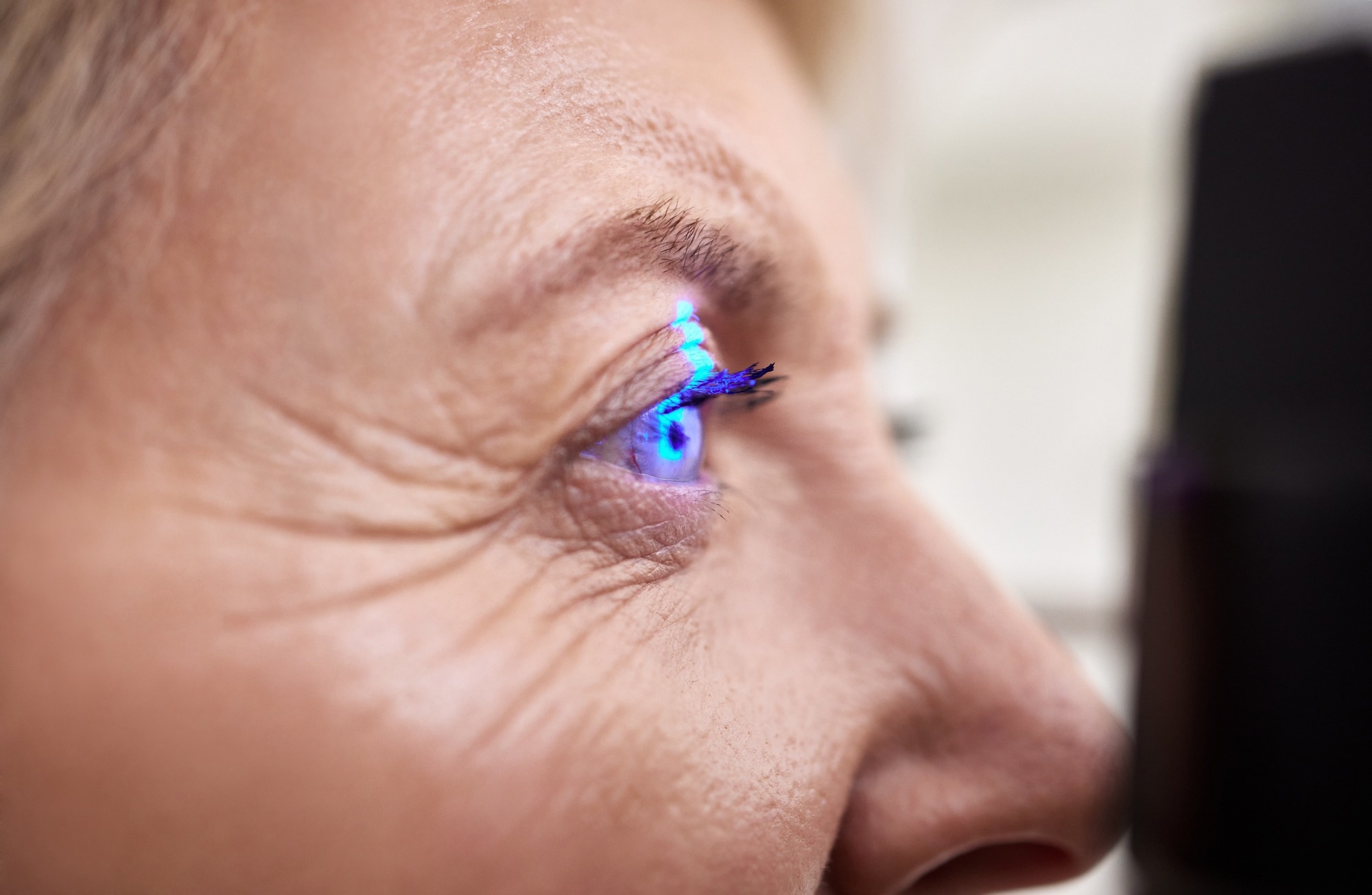
[ad_1]
In a latest research revealed within the Journal of Biomedical Optics, researchers reveal the multimodal performance of focused ocular fluorescence spectroscopy in vitro and in vivo.
 Study: Targeted spectroscopy in the eye fundus. Image Credit: FolksImages.com – Yuri A / Shutterstock.com
Study: Targeted spectroscopy in the eye fundus. Image Credit: FolksImages.com – Yuri A / Shutterstock.com
Background
Some typical structural and practical modifications happen within the eyes, particularly the attention fundus, as a result of ocular illnesses like diabetic retinopathy (DR), age-related macular degeneration (AMD), and glaucoma. Neurological illnesses like Alzheimer’s illness (AD) and Parkinson’s illness (PD) also can result in retinal modifications, reminiscent of thinning of the retinal nerve fiber layer (RNFL) and modifications in hemodynamics.
Given the extremely heterogeneous options and composition of the attention fundus, biomarkers both get broadly dispersed all through this tissue or localize to particular areas. For instance, β-amyloid plaques unfold all through the retina of AD sufferers, whereas sufferers with DR have localized hemorrhages.
Typical imaging strategies don’t present sufficient information on retinal modifications induced by these illnesses as in comparison with focused ocular diffuse reflectance spectroscopy (DRS). Ocular DRS strategies allow spectral evaluation of particular elements of the attention fundus, together with the optic disc, peripheral retina, and fovea between 500 and 800 nanometers (nm).
Diffuse reflectance and fluorescence spectroscopy also can elucidate the influence of things like lipofuscin accumulation, RNFL structural modifications, blood absorption spectrum, and melanin spectral profile, all of which influence the optical properties of retinal tissues.
About the research
In the present research, researchers establish the important thing options of the focused ocular spectroscopy know-how in vitro utilizing a reference goal and mannequin eye. The reference goal was an ultrahigh-definition display with a grid of eight completely different colours, with the fundus digital camera positioned in entrance of it and solely amassing gentle emitted by the display. The OEMI-7 eye mannequin, a seven mm pupil precisely simulating the human eye, helped validate these DRS acquisitions.
Subsequently, in vivo imaging and DRS have been used to evaluate blood oxygen saturation (StO2) within the optic nerve head and parafovea of eight wholesome research members who offered knowledgeable consent earlier than the research. These people have been between 27 and 35 years of age, had no systemic illnesses or treatment, and had regular outcomes following eye examinations.
The pointing gentle emitting diode (LED) illuminated the precise place of the particular area of spectral acquisition (ROSA), which allowed the digital camera to seize its location. A two-step acquisition sequence was used, adopted by mixed imaging and focused spectroscopy.
The location of the DRS acquisition space was decided based mostly on the ROSA picture segmentation. Spectra have been acquired by transferring the ROSA to 6 completely different areas inside the subject of view of the reference goal for spectral evaluation.
Bandpass filters isolate the excitation illumination for inexperienced fluorescence imaging. Comparatively, long-pass filters enabled unique imaging and spectral acquisition of sunshine emitted by fluorescence.
Spectral evaluation concerned three processing steps, whereby ambient gentle spectral contributions from the spectrum have been eliminated, and the impact of the illumination supply spectrum was subsequently decided. The gentle spectrum was then normalized to right for variations in sign depth.
Study findings
The mannequin eye acquired reflectance spectra from blood vessels, the retina close to the optic nerve head, the optic nerve head, and the retina removed from the optic nerve head (D). The blood vessels and optic nerve exhibited clearly completely different reflectance spectra. Similarly, the mannequin eye helped carry out fluorescence evaluation for 4 areas, with solely the blood vessels and optic nerve head emitting fluorescence alerts.
Five-second DRS acquisitions corresponded to 13 acquired spectra and have been made on the optic nerve head and parafovea for all eight members. Average absorbance spectra for each areas confirmed interindividual variability.
All earlier strategies to evaluate blood oxygen saturation within the eye had restricted sensitivity and, because of this, allowed for the relative evaluation of StO2 just for massive blood vessels of the attention fundus. In the present research, blood oxygen saturation measurements made in several areas led to completely different values of StO2.
Lower oxygen saturation and extra interindividual variability in StO2 have been noticed within the parafovea than within the optic nerve head, starting from 30.4-58.4% and 62.1-69.7%, respectively.
An ocular oximetry algorithm was applied for spectra acquired in vivo and demonstrated the potential to evaluate the presence of various fluorophores/chromophores that can be utilized to diagnose completely different retinal pathologies. More particularly, this method focused particular areas of curiosity that have been recognized by wide-field fluorescence and bought a complete emission spectral profile of those molecules.
Conclusions
The multimodal system introduced on this research enabled concurrent and steady imaging and focused spectroscopy within the eye fundus. Moreover, it confirmed excessive sensitivity, spectral decision, and brief acquisition velocity for retinal biomarker detection. It is noteworthy as a result of different programs, reminiscent of hyperspectral imaging, compromise between spectral decision and acquisition velocity.
Further, this know-how acquired distinct spectral profiles within the completely different areas examined throughout in vitro and through in vivo testing. To conclude, focused ocular spectroscopy might open novel methods to diagnose and deal with eye illnesses over time.
Journal reference:
- Lapointe, N., Akitegetse, C., Poirier, J., et al. (2023). Targeted spectroscopy within the eye fundus. Journal of Biomedical Optocs 28(12).doi:10.1117/1.JBO.28.12.126004
[adinserter block=”4″]
[ad_2]
Source link